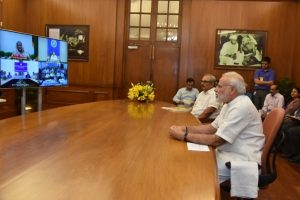According to an Indian Ministry of External Affairs (MEA) statement, India’s Prime Minister Narendra Modi will virtually inaugurate a new bridge on the Feni river flowing between the Indian northeastern state of Tripura and Bangladesh on March 9. Called Maitri Setu (“friendship bridge”), the bridge would be one of several infrastructure projects in Tripura Modi is scheduled to inaugurate that day. According to the MEA, “the construction was taken up by the National Highways and Infrastructure Development Corporation Ltd at a project cost of Rs. 133 Crores [1.3 billion Indian rupees, or $18.2 million]. The 1.9 Km long bridge joins Sabroom in India with Ramgarh in Bangladesh.”
“It is poised to herald a new chapter for trade and people to people movement between India and Bangladesh. With this inauguration, Tripura is set to become the ‘Gateway of North East’ with access to Chittagong Port of Bangladesh, which is just 80 Kms from Sabroom,” the MEA statement added.
The inauguration of the new bridge and other projects sit on top of frenetic diplomatic engagement between both countries this year which marks the 50th anniversary of an independent Bangladesh. On March 4, Indian External Affairs Minister S. Jaishankar had visited Dhaka. An MEA statement on the occasion had noted, that the visit “follows on the PM-level Virtual Summit held between two countries on December 17, 2020 and will also provide an opportunity to take stock of the progress in bilateral relations.”
Among other projects Modi is scheduled to virtually kick off on March 9 include laying the foundation stone for an Integrated Check Post at Sabroom which, the MEA claims, will “help ease the movement of goods and passengers between the two countries.” The remainder of the projects on Modi’s agenda involve improving connectivity and infrastructure within Tripura.
Modi is scheduled to visit Bangladesh on March 26, a day the country celebrates as its Independence Day. India’s recent outreach to that country has also included supplying 9 million doses of an indigenously manufactured COVID-19 vaccine, 2 million of which was provided free of cost. Noting that providing Bangladesh with access to Indian vaccines was on the agenda of Modi’s virtual December meeting with the country’s Prime Minister Sheikh Hasina, an Indian government source told Hindustan Times: “India has kept the promise that it had made.”
A 122-member contingent from the Bangladesh military (including its navy and air force) participated in the Indian Republic Day parade in New Delhi on January 26 this year (which was, in any case, foreshadowed by violence on the streets of the national capital as sections of protesting farmers ran amok), highlighting the degree to which both sides are keen on publicly displaying their bonhomie this year. For India, its victory over Pakistan in a 1971 war which saw an independent state of Bangladesh created out of Pakistan’s eastern wing is an unparalleled military achievement. For Bangladesh, this year’s anniversary offers a natural opportunity to bring Dhaka’s relations with New Delhi back on track which had been upset due to a variety of reasons.
The growing influence of China in Bangladesh in the recent years, especially following President Xi Jinping’s Dhaka visit in October 2016, had been an issue of concern for India, sitting on top of its inability to resolve the Teesta river dispute due to domestic political constraints. However, matters had not been helped by the ruling Bharatiya Janata Party’s 2019 election rhetoric targeting illegal Bangladeshi Muslim immigrants.
Interestingly enough, as election campaigning in Assam and West Bengal reach a fever pitch – both states are scheduled to go to regional polls over the next couple of months – the BJP has so far managed to keep a tight lid of campaign pronouncements that could stand (even obliquely) to affect India’s relations with Bangladesh.

































